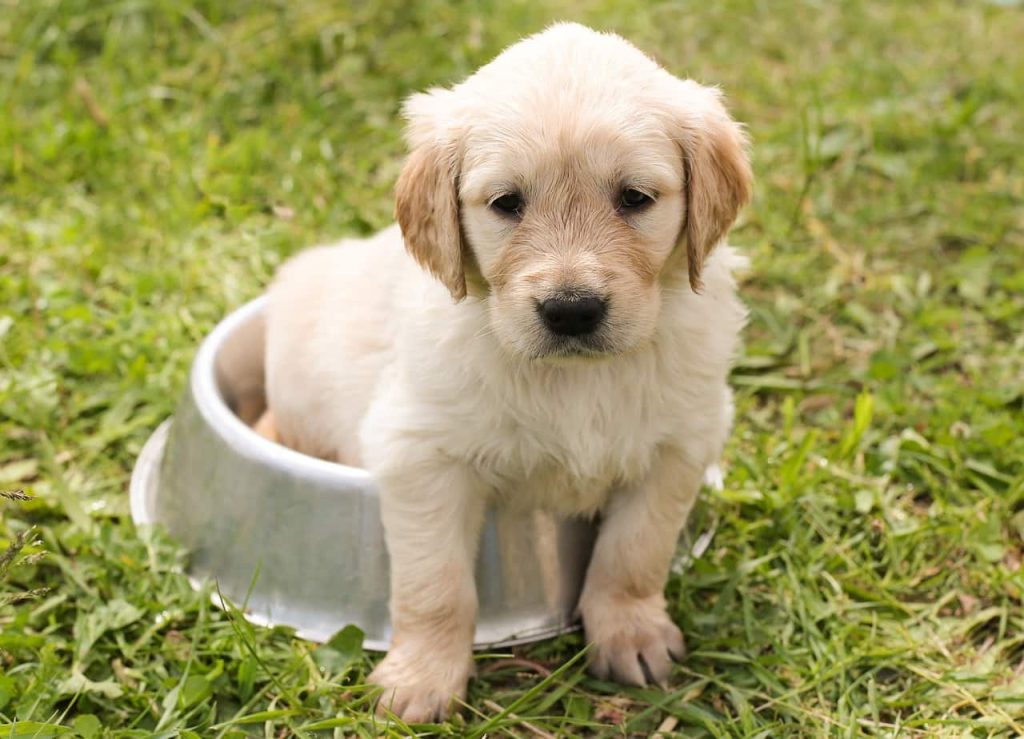As beloved companions in countless households worldwide, golden retrievers hold a special place in the hearts of many. Their friendly demeanour, boundless energy, and unwavering loyalty make them cherished members of the family. However, ensuring their well-being involves more than just love and attention; it requires a keen understanding of their unique nutritional needs.
It doesn’t matter whether you’re a proud owner of a golden retriever or you’re just preparing to get your very first puppy. The market is overflowing with various brands and products, so choosing the best food for golden retriever dogs can pose a real challenge. That’s why we created this guide! Read on to find out everything you need to know about golden retriever nutritional needs, as well as our food recommendations for every stage of their lives.
Understanding Golden Retriever Dietary Needs
Understanding what your golden retriever needs in their diet is key to keeping them healthy and happy. These lovable pups have different nutritional needs as they grow, so it’s important to pay attention and adjust their diet accordingly.
Whether you’re caring for a playful golden retriever puppy or a wise old senior, making sure they get the right nutrients is vital for their well-being. Let’s take a closer look at golden retrievers and their dietary needs at different life stages below.
Nutritional Differences Between Puppies, Adults, and Seniors
Nutritional requirements vary significantly between golden retriever puppies, adults, and seniors, reflecting their distinct stages of life.
During the puppy stage, you need to focus on fostering healthy growth and development. Golden retriever puppies require dog foods rich in high-quality proteins, essential fats, vitamins, and minerals to support their rapidly growing bodies and developing immune systems.
As golden retrievers transition into adulthood, their nutritional needs shift to maintaining an ideal weight, energy level, and overall health. A balanced diet that provides the right amount of proteins and fats is crucial to support their active lifestyle.
Senior golden retrievers have different dietary needs, often requiring fewer calories to prevent weight gain while focusing on joint health and cognitive function. Senior dog food formulas enriched with glucosamine, chondroitin, and antioxidants can help alleviate age-related issues and keep your older dog happy and healthy. Additionally, you may consider adding probiotics to their diet to support their digestive system.
| Life stage | Key foods/ingredients | Benefits |
| Puppy | High-quality proteins (e.g., chicken, turkey), DHA-rich sources (e.g., fish oil), complex carbohydrates (e.g., sweet potatoes, brown rice), vitamins (A, D, E), minerals (calcium, phosphorus) | Healthy growth and development, strong muscles, bones, and immune system, cognitive development, energy for play and exploration |
| Adult | A balanced mix of proteins (e.g., lean meats, fish), whole grains (e.g., brown rice, oatmeal), healthy fats (e.g., salmon oil, flaxseed), fruits (e.g., blueberries, apples), and vegetables (e.g., carrots, spinach), vitamins (B, C), minerals (iron, zinc) | Maintaining optimal weight, support for muscle maintenance and energy levels, energy for daily activities and exercise, strong immune system, maintaining overall health and vitality |
| Senior | Reduced calorie content, glucosamine, chondroitin, omega-3 fatty acids (e.g., fish oil), antioxidants (e.g., vitamin E, selenium), easy-to-digest proteins (e.g., chicken, lamb), fruits (e.g., cranberries, bananas), and vegetables (e.g., pumpkin, broccoli), vitamins (B12, D), minerals (potassium, magnesium) | Weight gain prevention and healthy weight management, joint health and mobility support, maintaining cognitive function and strong immune system, aid in digestion and nutrient absorption, maintaining overall well-being |
 The Importance of Choosing the Right Food for Each Life Stage
The Importance of Choosing the Right Food for Each Life Stage
As devoted dog owners, people should always want what’s best for their beloved four-legged companions. Just like humans, golden retrievers have unique nutritional needs that evolve throughout their lives. Because of that, choosing the right food for each life stage of a golden retriever is extremely important.
There are several factors you need to consider when looking for the best dog food for golden retriever breeds:
- Life stage: Golden retrievers have different nutritional needs depending on their life stage, whether they’re puppies, adults, or seniors. Choose a dog food formulated specifically for their age group to provide the appropriate balance of nutrients.
- Nutritional content: Look for dog foods with high-quality protein sources as the main ingredient, such as chicken, beef, or fish. Also, make sure that the food contains essential vitamins, minerals, and fatty acids for overall health and vitality.
- Ingredients: Opt for dog foods with wholesome, natural ingredients and avoid those containing fillers, artificial preservatives, colours, and flavours. Whole grains, fruits, and vegetables can provide additional nutritional benefits.
- Protein and fat levels: Golden retrievers are active breeds that require moderate to high levels of protein, as well as healthy fats, to support their energy needs and maintain muscle mass. Choose a dog food with appropriate protein and fat levels for their activity level and age – for example, senior dogs won’t be as active as golden retriever puppies, so their dietary needs will be different.
- Joint health support: Golden retrievers are prone to joint issues like hip dysplasia and arthritis. When choosing the best golden retriever dog food, look for products containing glucosamine and chondroitin to support joint health and mobility, especially for seniors or those with a family history of joint problems.
- Allergies and food sensitivities: Some golden retrievers may have food allergies or sensitivities to certain ingredients like grains, poultry, or artificial additives. If your golden retriever has known allergies or sensitivities, opt for hypoallergenic or limited-ingredient dog foods.
- Caloric needs: Monitor your golden retriever’s weight and adjust their food intake accordingly to maintain a healthy body condition. Choose dog foods with appropriate calorie levels for their age, size, and activity level to prevent obesity or undernourishment.
Pro tip: Always consult with your veterinarian before making any significant changes to your golden retriever’s diet. They can provide personalised recommendations based on your dog’s individual needs, health history, and any other specific dietary requirements they might have.
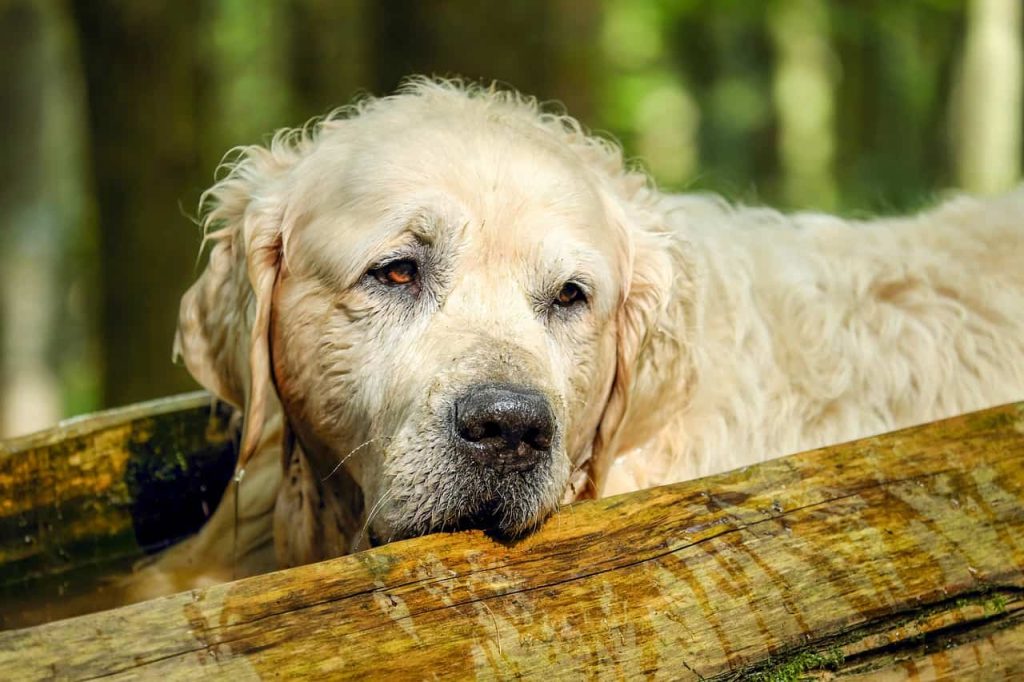
Introducing a New Food Safely: Tips for a Smooth Transition
Introducing a new food to your golden retriever can be tricky at first, especially if they’re used to a certain diet. In a nutshell, you need to take it one step (or paw) at a time to ensure a smooth transition and minimise any digestive upset. Here are some tips for introducing a new food to your golden retriever safely:
- Do it gradually: Start by mixing a small amount of the new dog food with your dog’s current food, gradually increasing the proportion of the new food over 7-10 days. This gradual transition allows your dog’s digestive system to adapt to the new food little by little.
- Monitor their digestive health: Keep an eye on your dog’s stool during the transition period. Loose stools or diarrhoea may indicate that the new food does not agree with your pet’s stomach. If this happens, slow down the transition process or consult with your veterinarian for guidance.
- Be consistent: Stick to a consistent feeding schedule during the transition period to help your golden retriever adjust to the new food more easily. Consistency can also help prevent any disruptions to your dog’s digestive system.
- Mix things up: Mix the new food thoroughly with the old food to ensure that your dog gets a taste of both in each meal. This can help encourage your golden retriever to eat the new food and make the transition more palatable.
- Don’t forget about positive reinforcement: Encourage your golden retriever to try the new food by offering praise or small treats alongside mealtime. Positive reinforcement can help create a positive association with the new food and make the transition smoother.
- Be patient: Patience is key during the transition process, as it may take some time for your golden retriever to fully adjust to the new food. Avoid rushing the transition, as this can lead to digestive upset and reluctance to eat.
Mutz Nutz Top Picks for Golden Retrievers
Below, you’ll find Mutz Nutz top picks for the best dog food for golden retrievers at every stage of their lives.
Puppy Food
1. Return To The Wild – Grain Free Puppy – Chicken, Turkey, Salmon, Sweet Potato & Carrot
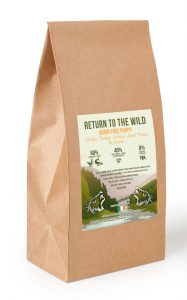
Our rating: 5/5
Main protein source: poultry and fish
Key ingredients: 60% poultry and fish; 40% vegetables, seeds and supplements; 0% cereals and grains, prebiotics MOS and FOS
Type: grain-free
Best for: golden retriever puppies
Why we love it:
- Chicken is a high-quality protein that supports muscle growth, as well as brain and eye development
- Fish as a source of Omega-3 supports the development of cognitive and visual skills, promotes healthy skin and coat
- Prebiotics MOS and FOS support digestive health
- Hypoallergenic formula – no grains or cereals
2. Burns Puppy Original Chicken & Rice
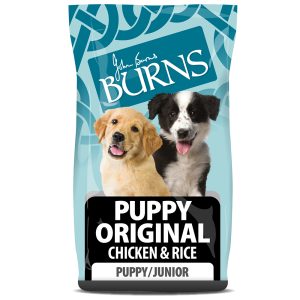
Our rating: 5/5
Main protein source: chicken
Key ingredients: Chicken (30%), brown rice (21%), white rice (21%), oats, peas, vitamins and minerals
Type: grain-inclusive (brown rice, white rice, oats)
Best for: golden retriever puppies
Why we love it:
- Healthy development and growth due to high-quality protein
- Whole grains are a great source of fiber
- Healthy skin and coat support
- Product developed by a veterinarian, John Burns
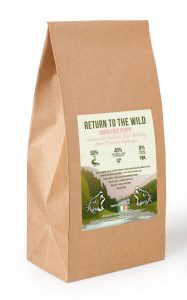
Our rating: 5/5
Main protein source: fish
Key ingredients: 60% salmon, blue whiting, haddock, 14% sweet potato, vitamins and minerals
Type: grain-free
Best for: golden retriever puppies
Why we love it:
- Highly digestible animal protein for optimal growth and development
- Omega-3 for cognitive function and visual development
- Hypoallergenic formula – no grains or cereals
Adult Food
1. Royal Canin Medium Adult 4kg
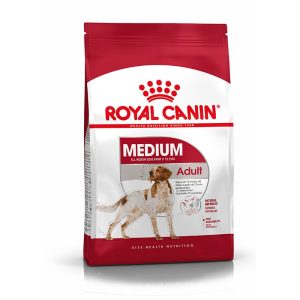
Our rating: 5/5
Main protein source: poultry
Key ingredients: poultry, flour, wheat, animal proteins
Type: grain-inclusive
Best for: adult golden retriever
Why we love it:
- Easily digestible formula
- Balanced protein and fats help maintain healthy weight and support energy needs
- Added vitamins and minerals for healthy skin and coat
2. Forthglade Adult Dog Salmon, Potato & Vegetables
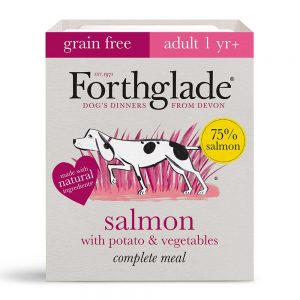
Our rating: 5/5
Main protein source: salmon
Key ingredients: 75% salmon, potato, carrots, peas, 10% crude oils and fats
Type: grain-free
Best for: adult golden retriever
Why we love it:
- High-protein content provides balanced nutrition for active dogs
- Added vitamins, minerals and prebiotics promote healthy skin and coat
- Award-winning bestseller – your golden retriever is going to love it!
Senior Food
1.Canagan Complete Wet Food – Grain Free Senior Fest
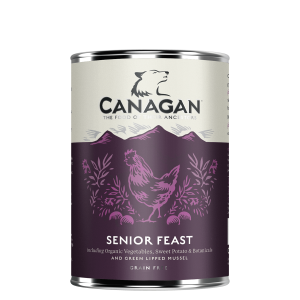
Our rating: 5/5
Main protein source: poultry
Key ingredients: 40% chicken, 20% turkey, vegetables (sweet potato, carrots, peas, broccoli)
Type: grain-free
Best for: senior golden retriever
Why we love it:
- High-quality protein helps maintain muscle mass with consideration to decreased activity level
- Balanced composition promotes healthy weight
- Grain-free formula and natural ingredients for optimal digestion
2. Burns Adult & Senior Weight Control – Chicken & Oats
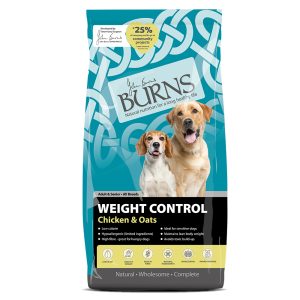
Our rating: 5/5
Main protein source: chicken
Key ingredients: 40% chicken,
Type: grain-inclusive (oats)
Best for: senior golden retriever
Why we love it:
- High-fibre, low-calorie formula supports energy needs and maintains muscle mass
- Dedicated formula for healthy weight maintenance and control
- No added beef, wheat or dairy, gluten-free formula promotes optimal digestion
Final Thoughts
From the playful puppy days to the golden years of seniority, golden retrievers rely on us to provide them with the best nutrition possible. By understanding their unique dietary requirements and making informed choices, we can ensure that our beloved companions thrive at every stage of their lives.
So, let’s continue to prioritise their well-being by feeding them the love and care they deserve, one nutritious meal at a time. With our recommendations, choosing the best food for your beloved golden retriever shouldn’t be a problem!
Visit Mutz Nutz today to explore our range of golden retriever-approved products!
As beloved companions in countless households worldwide, golden retrievers hold a special place in the hearts of many. Their friendly demeanour, boundless energy, and unwavering loyalty make them cherished members of the family. However, ensuring their well-being involves more than just love and attention; it requires a keen understanding of their unique nutritional needs.
It doesn’t matter whether you’re a proud owner of a golden retriever or you’re just preparing to get your very first puppy. The market is overflowing with various brands and products, so choosing the best food for golden retriever dogs can pose a real challenge. That’s why we created this guide! Read on to find out everything you need to know about golden retriever nutritional needs, as well as our food recommendations for every stage of their lives.
Understanding Golden Retriever Dietary Needs
Understanding what your golden retriever needs in their diet is key to keeping them healthy and happy. These lovable pups have different nutritional needs as they grow, so it’s important to pay attention and adjust their diet accordingly.
Whether you’re caring for a playful golden retriever puppy or a wise old senior, making sure they get the right nutrients is vital for their well-being. Let’s take a closer look at golden retrievers and their dietary needs at different life stages below.
Nutritional Differences Between Puppies, Adults, and Seniors
Nutritional requirements vary significantly between golden retriever puppies, adults, and seniors, reflecting their distinct stages of life.
During the puppy stage, you need to focus on fostering healthy growth and development. Golden retriever puppies require dog foods rich in high-quality proteins, essential fats, vitamins, and minerals to support their rapidly growing bodies and developing immune systems.
As golden retrievers transition into adulthood, their nutritional needs shift to maintaining an ideal weight, energy level, and overall health. A balanced diet that provides the right amount of proteins and fats is crucial to support their active lifestyle.
Senior golden retrievers have different dietary needs, often requiring fewer calories to prevent weight gain while focusing on joint health and cognitive function. Senior dog food formulas enriched with glucosamine, chondroitin, and antioxidants can help alleviate age-related issues and keep your older dog happy and healthy. Additionally, you may consider adding probiotics to their diet to support their digestive system.
| Life stage | Key foods/ingredients | Benefits |
| Puppy | High-quality proteins (e.g., chicken, turkey), DHA-rich sources (e.g., fish oil), complex carbohydrates (e.g., sweet potatoes, brown rice), vitamins (A, D, E), minerals (calcium, phosphorus) | Healthy growth and development, strong muscles, bones, and immune system, cognitive development, energy for play and exploration |
| Adult | A balanced mix of proteins (e.g., lean meats, fish), whole grains (e.g., brown rice, oatmeal), healthy fats (e.g., salmon oil, flaxseed), fruits (e.g., blueberries, apples), and vegetables (e.g., carrots, spinach), vitamins (B, C), minerals (iron, zinc) | Maintaining optimal weight, support for muscle maintenance and energy levels, energy for daily activities and exercise, strong immune system, maintaining overall health and vitality |
| Senior | Reduced calorie content, glucosamine, chondroitin, omega-3 fatty acids (e.g., fish oil), antioxidants (e.g., vitamin E, selenium), easy-to-digest proteins (e.g., chicken, lamb), fruits (e.g., cranberries, bananas), and vegetables (e.g., pumpkin, broccoli), vitamins (B12, D), minerals (potassium, magnesium) | Weight gain prevention and healthy weight management, joint health and mobility support, maintaining cognitive function and strong immune system, aid in digestion and nutrient absorption, maintaining overall well-being |
 The Importance of Choosing the Right Food for Each Life Stage
The Importance of Choosing the Right Food for Each Life Stage
As devoted dog owners, people should always want what’s best for their beloved four-legged companions. Just like humans, golden retrievers have unique nutritional needs that evolve throughout their lives. Because of that, choosing the right food for each life stage of a golden retriever is extremely important.
There are several factors you need to consider when looking for the best dog food for golden retriever breeds:
- Life stage: Golden retrievers have different nutritional needs depending on their life stage, whether they’re puppies, adults, or seniors. Choose a dog food formulated specifically for their age group to provide the appropriate balance of nutrients.
- Nutritional content: Look for dog foods with high-quality protein sources as the main ingredient, such as chicken, beef, or fish. Also, make sure that the food contains essential vitamins, minerals, and fatty acids for overall health and vitality.
- Ingredients: Opt for dog foods with wholesome, natural ingredients and avoid those containing fillers, artificial preservatives, colours, and flavours. Whole grains, fruits, and vegetables can provide additional nutritional benefits.
- Protein and fat levels: Golden retrievers are active breeds that require moderate to high levels of protein, as well as healthy fats, to support their energy needs and maintain muscle mass. Choose a dog food with appropriate protein and fat levels for their activity level and age – for example, senior dogs won’t be as active as golden retriever puppies, so their dietary needs will be different.
- Joint health support: Golden retrievers are prone to joint issues like hip dysplasia and arthritis. When choosing the best golden retriever dog food, look for products containing glucosamine and chondroitin to support joint health and mobility, especially for seniors or those with a family history of joint problems.
- Allergies and food sensitivities: Some golden retrievers may have food allergies or sensitivities to certain ingredients like grains, poultry, or artificial additives. If your golden retriever has known allergies or sensitivities, opt for hypoallergenic or limited-ingredient dog foods.
- Caloric needs: Monitor your golden retriever’s weight and adjust their food intake accordingly to maintain a healthy body condition. Choose dog foods with appropriate calorie levels for their age, size, and activity level to prevent obesity or undernourishment.
Pro tip: Always consult with your veterinarian before making any significant changes to your golden retriever’s diet. They can provide personalised recommendations based on your dog’s individual needs, health history, and any other specific dietary requirements they might have.

senior golden retriever
Introducing a New Food Safely: Tips for a Smooth Transition
Introducing a new food to your golden retriever can be tricky at first, especially if they’re used to a certain diet. In a nutshell, you need to take it one step (or paw) at a time to ensure a smooth transition and minimise any digestive upset. Here are some tips for introducing a new food to your golden retriever safely:
- Do it gradually: Start by mixing a small amount of the new dog food with your dog’s current food, gradually increasing the proportion of the new food over 7-10 days. This gradual transition allows your dog’s digestive system to adapt to the new food little by little.
- Monitor their digestive health: Keep an eye on your dog’s stool during the transition period. Loose stools or diarrhoea may indicate that the new food does not agree with your pet’s stomach. If this happens, slow down the transition process or consult with your veterinarian for guidance.
- Be consistent: Stick to a consistent feeding schedule during the transition period to help your golden retriever adjust to the new food more easily. Consistency can also help prevent any disruptions to your dog’s digestive system.
- Mix things up: Mix the new food thoroughly with the old food to ensure that your dog gets a taste of both in each meal. This can help encourage your golden retriever to eat the new food and make the transition more palatable.
- Don’t forget about positive reinforcement: Encourage your golden retriever to try the new food by offering praise or small treats alongside mealtime. Positive reinforcement can help create a positive association with the new food and make the transition smoother.
- Be patient: Patience is key during the transition process, as it may take some time for your golden retriever to fully adjust to the new food. Avoid rushing the transition, as this can lead to digestive upset and reluctance to eat.
Mutz Nutz Top Picks for Golden Retrievers
Below, you’ll find Mutz Nutz top picks for the best dog food for golden retrievers at every stage of their lives.
 Irish Owned
Irish Owned